DISTINGUISHED LECTURES
The Global Change Center’s Distinguished Lecture series brings some of the world’s leading scholars to the Blacksburg community to discuss critical environmental and societal issues in an open forum.
The GCC seeks to raise awareness about climate change and other global problems that threaten the environment and society.


DR. ASMERET ASEFAW BERHE
From the Ground Up: A soil scientist goes to Washington, DC
The Global Change Center at Virginia Tech is delighted to announce that their Distinguished Public Lecture will return this fall on October 3rd, featuring Dr. Asmeret Asefaw Berhe. Dr. Berhe, a prominent soil biogeochemist and the Director of the Office of Science for the U.S. Department of Energy, will present her public lecture titled "From the Ground Up: A Soil Scientist Goes to Washington, D.C." at the Moss Arts Center.
Hailing from early life and education in East Africa (Eritrea), Asmeret Asefaw Berhe's journey has taken her to the forefront of soil science and science policy. Dr. Berhe's research covers a spectrum of perspectives, from studying the disruption of soils due to landmines in conflict zones to investigating the repercussions of environmental changes like fires, erosion, and drought on soil processes. Dr. Berhe is currently on leave from the University of California, Merced where she holds the Ted and Jan Falasco Chair in Earth Sciences and Geology; is a Professor of Soil Biogeochemistry; and previously served as Associate Dean for Graduate Education. Her research focus lies at the intersection of soil science, global change science, and political ecology with an emphasis on how the soil system regulates the earth’s climate and the dynamic two-way relationship between the natural environment and human communities. Dr. Berhe is a member of the National Academy of Engineering, a Fellow of both the American Geophysical Union and the Geological Society of America, and a member of the inaugural class of the U.S. National Academies’ New Voices in Science, Engineering, and Medicine.
The lecture will trace Dr. Berhe's career trajectory, spanning from her foundational research in earth science as a soil biogeochemist to her present role as the Director of the Department of Energy’s Office of Science, where she leads the nation's largest supporter of basic research in the physical sciences. Infusing the perspective of an earth system scientist into the realm of science policy, Dr. Berhe's presentation will delve into how the Office of Science works to drive the frontiers of science across disciplines; enable solutions to some of the grand challenges of our time; and expand participation of folx from all walks of life in science.
EVENT DETAILS
- Date: Tuesday, October 3, 2023
- Time: 5:00 PM, Doors open at 4:30 PM
- Location: The Moss Arts Center, Fife Theater
- Free and open to the public.
PARKING
Campus parking is available in the North End Parking Garage on Turner Street. Virginia Tech faculty and staff possessing a valid Virginia Tech parking permit can enter and exit the garage free of charge. Visitors may park in the garage by taking a ticket at entry and paying with Visa or Mastercard upon exit. Virginia Tech has also partnered with ParkMobile to provide a convenient, contactless electronic payment option for parking, which may be used at any parking meter, campus parking space, or lot with standard F/S, C/G, or R parking.
Parking in downtown Blacksburg is free after 5:00 PM. Before 5:00 PM, payment for on-street parking is available via meter or pay station and is $1/hour.
ACCESSIBILITY
If you have any questions about the services at the Moss Arts Center or desire an accommodation, please contact us by email at mossartscenter@vt.edu or call 540-231-5300 at least 10 business days prior to an event. Learn more about accessibility at the Moss Arts Center.

LEIGH-KATHRYN BONNER
Moments That Matter: Effective Leadership Through the Eyes of a Beekeeper
Date: POSTPONED due to Virginia Tech COVID-19 mitigation strategy and large event cancelation policy (more info here).
Location: The Lyric Theatre in downtown Blacksburg
The 7th Annual Global Change Center distinguished lecture event with Leigh-Kathryn Bonner is postponed until further notice, details forthcoming.
Fourth generation beekeeper Leigh-Kathryn Bonner is a dynamic leader who started her entrepreneurial journey at just 22 years old. Raised in Raleigh, North Carolina, she spent her younger years on her family farm where she fell in love with agriculture. As the Founder and CEO of the rapidly expanding company Bee Downtown, she has made a name for herself in a historically male dominated industry.
Bee Downtown began as a school project during her junior year at North Carolina State University. The buzzing company keeps bees and creates one-of-a-kind employee engagement and leadership development experiences at many of the largest corporations in the world. The programming is facilitated at beehives which are placed and maintained by the Bee Downtown staff on corporate campuses.
Leigh-Kathryn’s enthusiasm and authenticity has earned Bee Downtown contracts with over 50 partners including Delta, Chick-Fil-A, COX Enterprises, Invesco, AT&T, SAS, Burt’s Bees, and Georgia Power. Bee Downtown’s 200+ hives house more than 12 million honeybees creating hundreds of thousands of acres of healthy pollinator habitat. The company has been featured by Forbes, BBC, Inc. Magazine, The Weather Channel, National Geographic, The New York Times, Southern Living Magazine, and more.
Leigh-Kathryn inspires, motivates, and moves audiences through her unique and captivating storytelling ability. She is a strong advocate for women and strives to use her platform to empower and transform leadership and environmental stewardship in an ever changing global economy. She is part of the TED speaking community, a 2018 INC Magazine-30 Under 30 Rising Star, and most recently named to the exclusive Forbes 30 Under 30 list.
MORE INFO:

Honeybees are one of nature’s most important workers, and they pollinate $15 billion worth of crops in the United States each year. However, honeybee populations — and the services they provide to ecosystems and society— are quickly declining.
To do her part in addressing this pressing global issue, Bonner founded Bee Downtown during her junior year of college. The company installs and maintain beehives on the roofs and campuses of corporations to rebuild honeybee populations in urban areas. Additionally, Bee Downtown offers educational programs, events, and leadership exercises to increase employee engagement in the workplace.
What began as a school project has grown to provide employee engagement and leadership development at more than 50 corporations like Delta, Chick-Fil-A, AT&T, and IBM. Bee Downtown now maintains more than 200 hives to house more than 12 million honeybees.
“Running a successful business is just like running a successful beehive,” Bonner said. “One honeybee makes a twelfth of a teaspoon of honey in her whole life. But together a hive can generate over a hundred pounds of honey in a matter of months. If we — as leaders, as a community — can work together, like a honeybee hive, we can collectively create a lasting change in the world that we are all proud to be a part of.”
By integrating sustainability with a corporate business model, Bonner engages employees in beekeeping while enabling them to “think outside the hive” on their leadership journey.
Bonner is a storyteller, environmental steward, and empowering leader. She is a 2019 Forbes 30 Under 30 Social Entrepreneur, a 2018 Inc Magazine 30 Under 30 Rising Star, a Southern Living Southerner of the Year, and a TEDx speaker. Top media outlets, such as Forbes, BBC, Inc Magazine, and the New York Times have featured Bonner’s work.
Bonner’s visit represents the seventh lecture in the public Distinguished Lecture Series sponsored by the Global Change Center at Virginia Tech. The lecture series brings some of the world’s leading scholars to the Blacksburg community to discuss critical environmental and societal issues in an open forum.
“The environmental problems we face today are so complex that it’s easy to become overwhelmed, leaving many to ponder how they can possibly make a positive difference. Leigh-Kathryn Bonner exemplifies the fact that every one of us can contribute towards solving the world’s most urgent challenges,” said William Hopkins, director of the Global Change Center at Virginia Tech and professor of fish and wildlife conservation in the College of Natural Resources and Environment. “She has taken her passion for protecting pollinators and turned this into a highly successful business model that teaches corporate leaders and their employees about sustainability and social responsibility. She is an inspirational example of how we can each contribute to a sustainable future.”
Coordinated by the Global Change Center at Virginia Tech, the event is free and open to the public, thanks to joint funding efforts from the Fralin Life Sciences Institute, College of Natural Resources and Environment, Apex Center for Entrepreneurs, College of Agriculture and Life Sciences and the Virginia Tech Graduate School.
“There is a big focus on entrepreneurship in the technology sector right now and we think it’s really important for students to understand all of the different ways that they can be innovative and successful. The hands-on, community-based business model that Bee Downtown has launched in the corporate realm is an excellent example of this. We’re thrilled to support bringing these types of leaders to Virginia Tech and the Blacksburg community”, said Sean Collins, director of the Apex Center for Entrepreneurs at Virginia Tech.
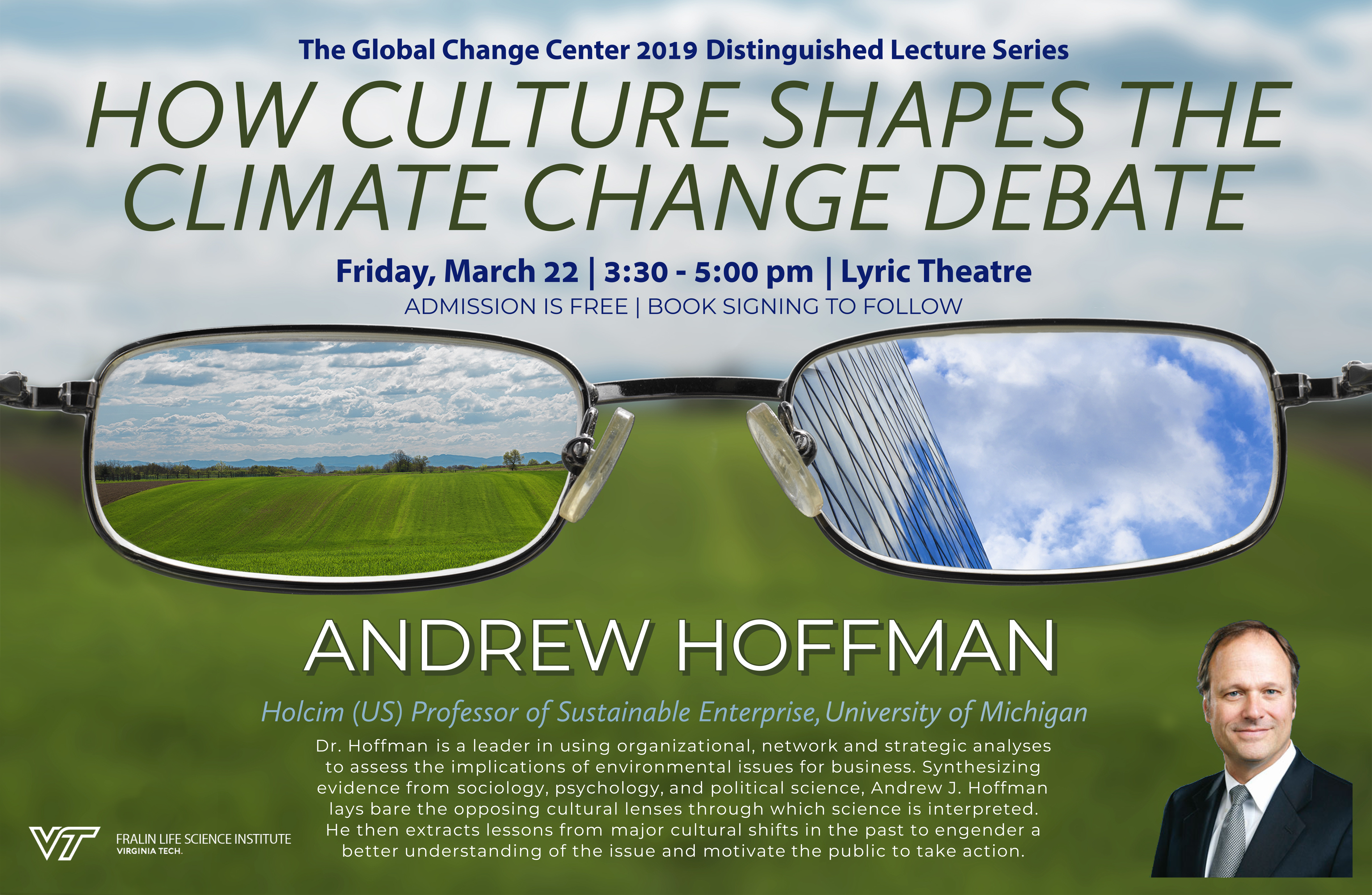
DR. ANDREW HOFFMAN
How Culture Shapes the Climate Change Debate
Date: Friday, March 22, 2019 at 3:30 p.m.
Location: The Lyric Theatre in downtown Blacksburg
UPDATE: View full lecture HERE.
Andrew Hoffman, a leader in using organizational, network and strategic analyses to assess the implications of environmental issues for business, will visit Virginia Tech on Friday, March 22.
He will give a 3:30 p.m. distinguished lecture, “How Culture Shapes the Climate Change Debate,” at the Lyric Theatre in downtown Blacksburg. The lecture is free and open to the public and will be followed by a book signing in the theatre’s main lobby.
Dr. Andrew Hoffman is the Holcim (US) Professor of Sustainable Enterprise at the University of Michigan. His research uses organizational behavior models and theories to understand the cultural and institutional aspects of environmental issues for organizations. He has published over 100 articles/book chapters, as well as 14 books, which have been translated into five languages. In this work, he focuses on the processes by which environmental issues both emerge and evolve as social, political and managerial issues, including:
- the evolving nature of field level pressures related to environmental issues
- the corporate responses that have emerged as a result of those pressures, particularly around the issue of climate change
- the interconnected networks among non-governmental organizations and corporations and how those networks influence change processes within cultural and institutional systems
- the social and psychological barriers to these change processes
- and the underlying cultural values that are engaged when these barriers are overcome
The Lyric Theatre is located at 135 College Ave. in Blacksburg. Doors will open at 2:30 p.m. Metered parking is available on the street as well as in the Kent Square garage. Anyone parking on the Virginia Tech campus before 5:00 pm will need a permit. For more information, please contact The Global Change Center (540-231-5400).
MORE INFO:
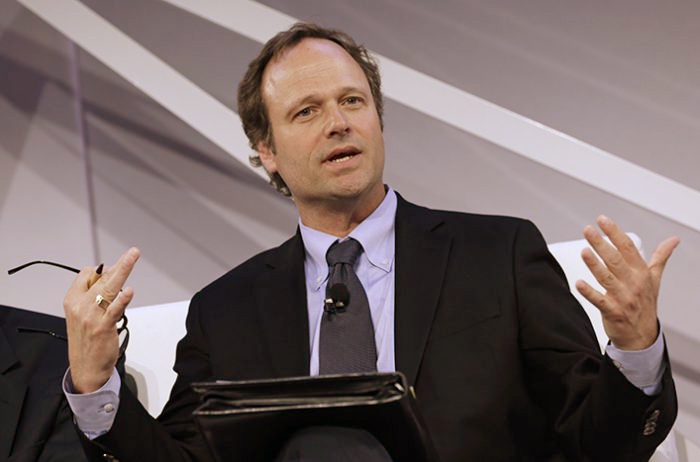
Andrew Hoffman, the Holcim Professor of Sustainable Enterprise for University of Michigan and author, will visit Virginia Tech on Friday, March 22.
Hoffman will give a 3:30 p.m. distinguished lecture titled “How Culture Shapes the Climate Change Debate” at the Lyric Theatre in downtown Blacksburg. The lecture will be followed by a question and answer session and book signing.
The event is coordinated by the Global Change Center at Virginia Tech, with funding from the Fralin Life Science Institute and the Virginia Tech Graduate School. It is free and open to the public.
Hoffman applies organizational behavioral models and theories to assess the cultural and institutional aspects behind environmental issues, including climate change. His work also addresses how environmental issues evolve socially, politically and managerially. Hoffman has published 14 books and more than 100 articles and book chapters on these topics, which have been translated into five languages. His 2015 book, How Culture Shapes the Climate Change Debate, garnered international media attention.
Hoffman’s work has resulted in a long list of honors, including the Aspen Institute’s Faculty Pioneer Award, the Maggie Award, an Aldo Leopold Fellowship, the Rachel Carson Book Prize, and the Klegerman Award.
In this lecture, Hoffman will discuss the sociology and psychology of why people reject climate change and how to address this issue. He offers suggestions for building trust and effectively communicating despite opposing viewpoints, arguing that culture is the barrier to acting on climate change.
“The current public and political debate over climate change in this country is not about carbon dioxide or climate models,” Hoffman said in a lecture at Yale University. “It’s about conflicting world views among people who feel their values are being threatened. We need to understand where they’re coming from.”
Top media outlets such as The New York Times, Scientific American, National Geographic, Atlantic, and National Public Radio have featured Hoffman’s work. He has also served on several prestigious research committees, including a National Academies of Sciences, Engineering, and Medicine Committee.
Hoffman’s visit represents the sixth lecture in a public Distinguished Lecture Series sponsored by the Global Change Center at Virginia Tech. The lecture series brings some of the world’s leading scholars to the Blacksburg community to discuss critical environmental and societal issues in an open forum.
“Dr. Hoffman is a dynamic speaker with a strong interdisciplinary perspective on environmental issues. His work has transformed the way we think about the critical leadership role of businesses in environmental sustainability, and on the way culture shapes the discussion around environmental issues. We are extremely fortunate to have him join us in Blacksburg to discuss how factors other than scientific data, such as norms, values, and communication, influence people’s perceptions and beliefs about climate change,” said William Hopkins, director of the Global Change Center at Virginia Tech and professor of fish and wildlife conservation in the College of Natural Resources and Environment.
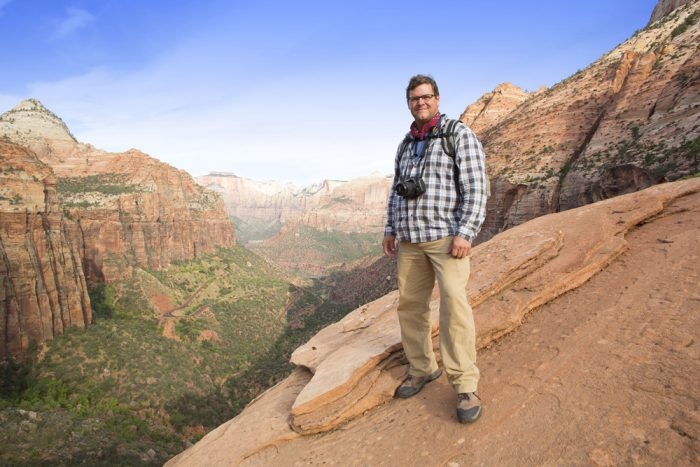
DR. KIRK JOHNSON
Natural History in the Age of Humans
Date: Friday, February 16, 2018 at 4:00 p.m.
Location: The Lyric Theatre in downtown Blacksburg
UPDATE: View Full Lecture HERE.
Kirk Johnson, a world-renowned paleontologist who focuses on fossil plants and the extinction of the dinosaurs, will visit Virginia Tech on Friday, February 16.
He will give a 4 p.m. distinguished lecture, “Natural History in the Age of Humans,” at the Lyric Theatre in downtown Blacksburg. The lecture is free and open to the public and will be followed by a book signing in the theatre’s main lobby.
Dr. Kirk Johnson is the Sant Director of the Smithsonian National Museum of Natural History. He oversees more than 440 employees and a collection of more than 145 million objects—the largest natural history collection in the world.
Johnson is a paleontologist who has led expeditions that have resulted in the discovery of more than 1,400 fossil sites. His research focuses on fossil plants and the extinction of the dinosaurs. He is known for his scientific articles, popular books, museum exhibitions, documentaries, and collaborations with artists. In 2010-11, he led the excavation of an ice age site near Snowmass Village, Colorado, that recovered more than 5,400 bones of mammoths, mastodons and other ice age animals. This dig was featured in the NOVA documentary, Ice Age Death Trap, and in Johnson’s book, Digging Snowmastodon, Discovering an Ice Age World in the Colorado Rockies. His recent documentaries include the three-part NOVA series Making North America, which aired on PBS networks in November 2015, and The Great Yellowstone Thaw which premiered on PBS in June 2017.
The Lyric Theatre is located at 135 College Ave. in Blacksburg. Doors will open at 3 p.m. Metered parking is available on the street as well as in the Kent Square garage. Anyone parking on the Virginia Tech campus before 5:00 pm will need a permit. For more information, please contact The Global Change Center (540–231-5400).
More Info:
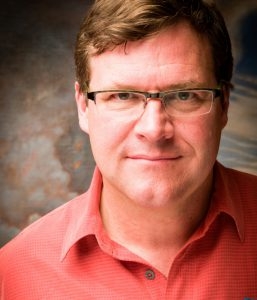
Kirk Johnson, a world-renowned paleontologist who focuses on fossil plants and the extinction of the dinosaurs, visited Virginia Tech on Friday, Feb. 16.
He gave a 4 p.m. distinguished lecture, “Natural History in the Age of Humans,” at the Lyric Theatre in downtown Blacksburg. The lecture was free and open to the public; it was followed by a book signing in the theatre’s main lobby.
The event was part of the annual Distinguished Public Lecture Series hosted by the Global Change Center at Virginia Tech, with funding from the Fralin Life Science Institute and the Virginia Tech Graduate School.
Johnson currently serves as the Sant Director of the Smithsonian National Museum of Natural History in Washington, D.C., where he oversees the world’s largest natural history collection comprised of more than 145 million specimens. As a paleontologist, Johnson has headed national and international expeditions that led to the discovery of 1,400 fossil sites.
One of Johnson’s most notable projects was the excavation of an ice age site near Snowmass Village, Colo., where more than 5,400 mammoth, mastodon, and other animal bones were recovered from that era. The dig was featured in the New York Times; on PBS in the NOVA documentary, “Ice Age Death Trap”; and served as the subject of his 2012 book, “Digging Snowmastodon: Discovering an Ice Age World in the Colorado Rockies,” co-authored with Ian Miller.
Johnson is author of several other books, some of which will be available for sale at the book signing. In 2016 he received a Kavli Science Journalism Award for hosting the three-part NOVA 2015 documentary series, “Making North America.” In 2017, he hosted “Great Yellowstone Thaw,” a documentary series co-produced by PBS and the BBC that chronicles how animals adapt to changing seasons in Yellowstone National Park.
Before joining the Smithsonian in 2012, Johnson served as chief curator of the Denver Museum of Natural History, where he directed the museum’s Prehistory Journey exhibit installation. He holds a Ph.D. in geology and paleobotany from Yale University and completed postdoctoral research in the northern Australian rainforests.
Johnson’s visit represents the fifth in a public Distinguished Lecture Series sponsored by the Global Change Center at Virginia Tech. The lecture series brings some of the world’s leading scholars to the Blacksburg community to discuss critical environmental and societal issues in an open forum.
“We were so fortunate to have Dr. Johnson, an eminent scholar and director of the world’s most popular natural history museum, engage the Blacksburg community. He lends a fascinating perspective to understanding today’s greatest societal challenges such as climate change,” said William Hopkins, director of the Global Change Center and professor of fish and wildlife conservation in the College of Natural Resources and Environment. “Dr. Johnson shared insights into what pre-historic processes can tell us about our future and the critical role that natural history museums play in research and science communication.”
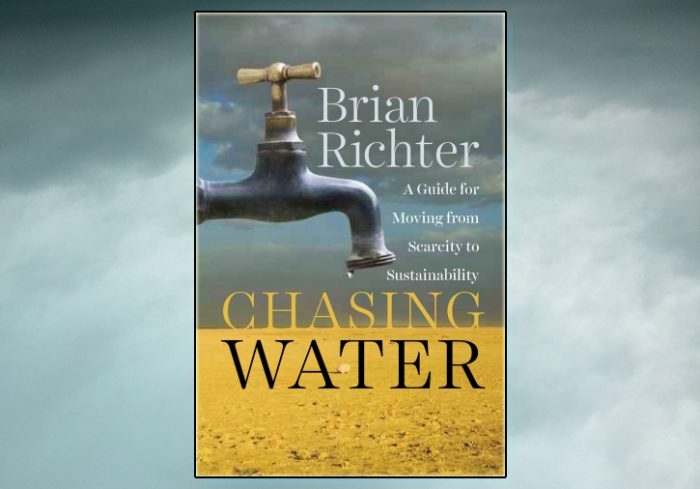
BRIAN RICHTER
Chasing Water in a Dynamically Changing World
Date: Friday, April 7, 2017, 4:00 p.m.
Location: The Lyric Theatre in downtown Blacksburg
UPDATE: View Full Lecture HERE.
The Global Change Center at Virginia Tech is pleased to welcome Brian Richter for a Distinguished Lecture at the Lyric Theatre entitled “Chasing Water in a Dynamically Changing World”.
Brian Richter has been a global leader in water science and conservation for more than 25 years. He is the President of Sustainable Waters, a global water education organization. He is also the Chief Scientist for the Water program of The Nature Conservancy, an international conservation organization, where he promotes sustainable water use and management with governments, corporations, and local communities. Brian serves as a water advisor to some of the world’s largest corporations, investment banks, and the United Nations, and has testified before the U.S. Congress on multiple occasions. He also teaches a course on Water Sustainability at the University of Virginia.
Brian has developed numerous scientific tools and methods to support river protection and restoration efforts, including the Indicators of Hydrologic Alteration software that is being used by water managers and scientists worldwide. He was featured in a BBC documentary with David Attenborough on “How Many People Can Live on Planet Earth?” He has published many scientific papers on the importance of ecologically sustainable water management in international science journals, and co-authored a book with Sandra Postel entitled Rivers for Life: Managing Water for People and Nature (Island Press, 2003). His latest book, Chasing Water: A Guide for Moving from Scarcity to Sustainability, was published in 2014.
MORE INFO:
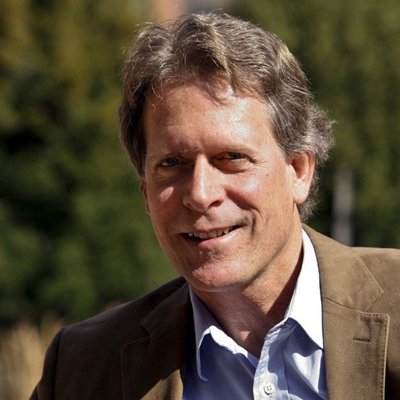
Brian Richter, the chief scientist for the Global Water Program of The Nature Conservancy, visited Virginia Tech on April 7, 2017. He gave a 4 p.m. distinguished lecture entitled “Chasing Water in a Rapidly Changing World” at the Lyric Theatre, followed by a question and answer period and book signing.
The event, coordinated by the Global Change Center at Virginia Tech and the Virginia Water Resources Research Center, was free and open to the public.
Richter has been a global leader in water science and conservation for more than 25 years. In his role at The Nature Conservancy, he promotes sustainable water use and management with governments, corporations, and local communities.
Richter is also the president of Sustainable Waters, a global water education organization. He has consulted on more than 150 water projects worldwide.
He serves as a water advisor to some of the world’s largest corporations, investment banks, and the United Nations, and has testified before the U.S. Congress on multiple occasions. A Virginia resident, Richter also teaches a course on Water Sustainability at the University of Virginia.
Richter has developed numerous scientific tools and methods to support river protection and restoration efforts, including the Indicators of Hydrologic Alteration software that is being used by water managers and scientists worldwide.
Richter was featured in a BBC documentary with David Attenborough on “How Many People Can Live on Planet Earth?” He has published many scientific papers on the importance of ecologically sustainable water management in international science journals, and co-authored a book with Sandra Postel entitled “Rivers for Life: Managing Water for People and Nature” (Island Press, 2003). His latest book, “Chasing Water: A Guide for Moving from Scarcity to Sustainability,” was published in 2014.
“Water shortages are now affecting half the world’s population, disrupting food and energy security as well as urban water supplies in many cities,” said Richter. “The overuse of water and associated drying of rivers, lakes, and aquifers has become a leading cause of freshwater species imperilment. Climate change forecasts foretell even greater challenges in many water-scarce regions. These threats to our water future can be ameliorated, but it will require bold and concerted action on the part of governments, city leaders, and farmers. My presentation will highlight the key solutions that must be implemented to address these water problems.”
Richter’s visit represents the fourth in a public Distinguished Lecture Series sponsored by the Global Change Center at Virginia Tech. The lecture series brings some of the world’s leading scholars to the Blacksburg community to discuss critical environmental and societal issues in an open forum.
“Water is one of our most important natural resources, affecting virtually every aspect of life including human health, coastal infrastructure, agricultural systems, national security, basic human rights, and conservation of critical biodiversity,” said Bill Hopkins, director of the Global Change Center and a professor in the Department of Fish and Wildlife Conservation in the College of Natural Resources and Environment. “Virginia Tech has emerged as a global leader in comprehensive sociological, scientific, and engineering studies of water resources, and is continuing to build capacity in water across the disciplines. We are thrilled to host one of the nation’s most respected water experts to discuss pressing water issues that affect the environment and society.”
“Water is life and is an irreplaceable natural resource,” said Stephen Schoenholtz, director of the Virginia Water Resources Research Center and a professor in the Department of Forest Resources and Environmental Conservation in the College of Natural Resources and Environment. “There are few people with the wealth of national and international experience in water sustainability as Brian Richter. He has also been extremely supportive of Virginia Tech’s efforts to provide unique water educational opportunities for our students through our new interdisciplinary undergraduate water degree program. The Virginia Water Resources Research Center was pleased to help host Brian’s visit to Virginia Tech, which provided him with opportunities to share his perspectives on water issues and solutions with our faculty and students.

DR. JOSH TEWKSBURY
Living in the Anthropocene: Science, Sustainability, and Society
Date: April 21, 2016
Location: The Lyric Theatre in downtown Blacksburg
UPDATE: View Full Lecture HERE.
The Global Change Center at Virginia Tech was pleased to welcome Dr. Josh Tewksbury for a Distinguished Lecture at the Lyric Theatre entitled “Living in the Anthropocene: Science, Sustainability, and Society”.
Dr. Tewksbury is an ecologist, conservation biologist, and planetary health scientist with experience both in academia and in civil society. He is currently the Director of the Colorado Global Hub, at Future Earth; Research Professor, University of Colorado, Boulder; and Senior Scholar, School of Global Environmental Sustainability, Colorado State University.
Tewksbury was the Walker Professor of Natural History at the University of Washington, with appointments both in the department of Biology and the College of the Environment, where his work focused on major global change issues, including the impacts of climate change on biodiversity, the potential of landscape connectivity to mitigate the impacts of climate change, and the impacts of species loss on ecosystem function.
MORE INFO:
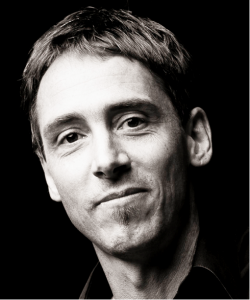
Josh Tewksbury, Director of the Colorado Global Hub at Future Earth, visited Virginia Tech on April 21 at the Lyric Theatre. His lecture, entitled “Living in the Anthropocene: Science, Sustainability and Society”, was sponsored by the Global Change Center at Virginia Tech.
Tewksbury is an ecologist, conservation biologist, and planetary health scientist with experience both in academia and in civil society. In addition to his appointment at Future Earth, Tewksbury is also a research professor at the University of Colorado, Boulder, and a senior scholar in the School of Global Environmental Sustainability at Colorado State University.
“Dr. Tewksbury is leading the charge to advance conservation and sustainability initiatives on a global scale,” said William A. Hopkins, director of the Global Change Center. “As director of the U.S. office of Future Earth, he is working with a broad international coalition of groups like the United Nations to pursue what has been called ‘possibly the largest, most ambitious international research program ever undertaken.’ As Virginia Tech is poised to advance its collective strengths in the environmental sciences, we are thrilled to have such an outstanding leader visit Blacksburg to engage in a community-wide discussion about critical issues facing our planet.”
Tewksbury was previously the Walker Professor of Natural History at the University of Washington, with appointments both in the department of biology and the College of the Environment, where his work focused on major global change issues, including the impacts of climate change on biodiversity, the potential of landscape connectivity to mitigate the impacts of climate change, and the impacts of species loss on ecosystem function.
In addition to more than a decade of academic work, Tewksbury also served as the founding director of the Luc Hoffmann Institute at WWF, a global research center based in Switzerland focused on the co-creation of multi-disciplinary research. As director, Tewksbury launched over a dozen research projects, including work on the Food-Energy-Water nexus in South-East Asia, development corridors in East Africa, global mapping of threats to biodiversity, and the development of regionally-appropriate low-carbon sustainability targets for urban areas.
Tewksbury’s current research interests include studies of direct and indirect effects of climate change on food security at large spatial scales, the potential of large-scale restoration to serve multiple human and biodiversity goals, and the contribution of science to large scale planetary health issues.
“Josh’s work lies at the critical nexus between conserving Earth’s biodiversity and meeting the needs of a growing population,” said David Haak, an assistant professor of plant pathology, physiology and weed science in the College of Agriculture and Life Sciences and a Fralin Life Science Institute affiliate. “To do this well requires a distinct capacity for thinking broadly and acting globally, and Josh does both of these exceptionally well. So, it is not surprising that he is emerging as a leader in global sustainable development.”
During his visit, Tewksbury met with students in the Interfaces of Global Change Interdisciplinary Graduate Education Program as well as with affiliated faculty in the Global Change Center.
This story was adapted from a VT News release written by Lindsay Key
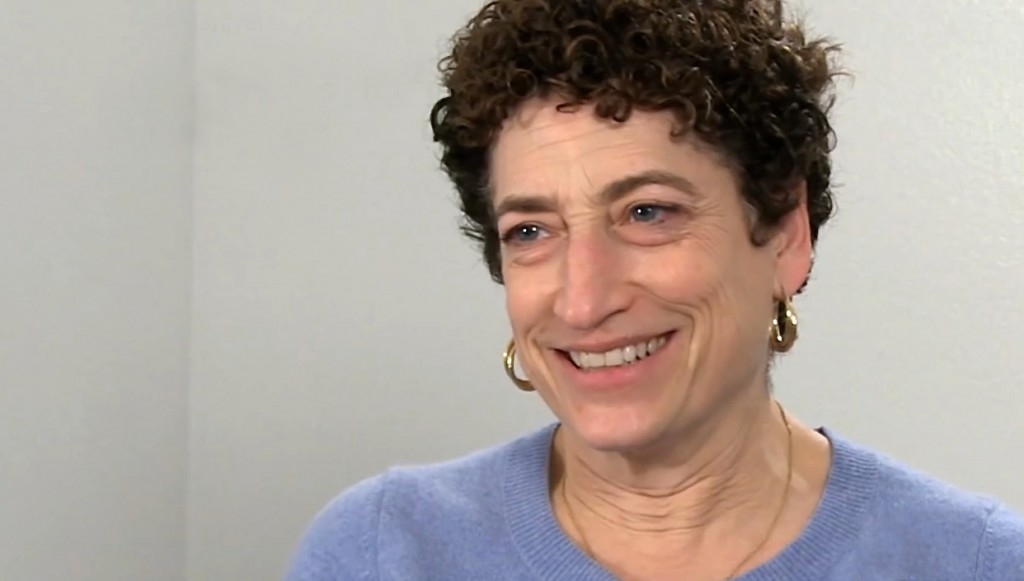
DR. NAOMI ORESKES
Should We Trust Science? Perspectives from the History and Philosophy of Science
Date: September 2, 2015
Location: The Lyric Theatre in downtown Blacksburg
UPDATE: View Full Lecture HERE.
The Global Change Center at Virginia Tech was pleased to welcome Dr. Naomi Oreskes, Harvard historian and author, for a Distinguished Lecture at the Lyric Theatre. Her lecture, entitled “Should We Trust Science? Perspectives from the History and Philosophy of Science”, was followed by a question and answer period and book signing. The free event was coordinated by the Global Change Center at Virginia Tech and co-sponsored by a number of units from across campus.
Dr. Oreskes is a professor of the history of science at Harvard University. Her research and writing focuses on understanding scientific consensus and dissent in relation to environmental science. She has received international acclaim for her 2010 book, “Merchants of Doubt, How a Handful of Scientists Obscured the Truth on Issues from Tobacco to Global Warming,” co-authored with Erik M. Conway, which was shortlisted for the Los Angeles Times Book Priced, received the 2011 Watson-Davis Prize from the History of Science Society, and was recently adapted into a documentary film.
MORE INFO:
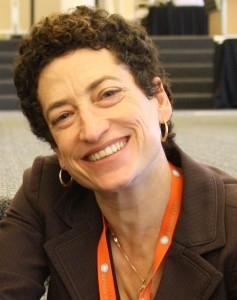
On September 2, 2015, the Global Change Center at Virginia Tech was pleased to welcome Dr. Naomi Oreskes, Harvard historian and author, for a Distinguished Lecture at the Lyric Theatre in downtown Blacksburg. Her lecture, entitled “Should We Trust Science? Perspectives from the History and Philosophy of Science”, was followed by a question and answer period and book signing.
The free event was coordinated by the Global Change Center at Virginia Tech and co-sponsored by a number of units from across campus.
Dr. Oreskes is a professor of the history of science at Harvard University. Her research and writing focuses on understanding scientific consensus and dissent in relation to environmental science.
She has received international acclaim for her 2010 book, “Merchants of Doubt, How a Handful of Scientists Obscured the Truth on Issues from Tobacco to Global Warming,” co-authored with Erik M. Conway, which was shortlisted for the Los Angeles Times Book Priced, received the 2011 Watson-Davis Prize from the History of Science Society, and was recently adapted into a documentary film.
Her 2014 book, The Collapse of Western Civilization: A View from the Future, also co-written with Conway, looks back at the present from the year 2093. For her 2004 essay in the journal Science, “The Scientific Consensus on Climate Change,” Oreskes analyzed nearly 1,000 scientific journals to assess the level of consensus around climate change. The paper has been widely cited, both in the United States and abroad, including in the Royal Society’s publication, “A Guide to Facts and Factors about Climate Change,” in the Academy-award winning film, An Inconvenient Truth, and in Ian McEwan’s novel, Solar.
”We are extremely excited to welcome such an outstanding and respected scholar to the Blacksburg community,” said William A. Hopkins, director of the Global Change Center at Virginia Tech and professor of fish and wildlife conservation in the College of Natural Resources and Environment. “Dr. Oreskes’ work emphasizes the critical role that science plays in maintaining our quality of life, and reveals the disparity that sometimes exists between the state of the science and public perceptions about critical scientific issues. Her lecture will discuss why these disparities exist, and demystify the process of scientific debate that can lead to scientific consensus.”
Oreskes’ visit represents the second in a public Distinguished Lecture Series sponsored by the Global Change Center at Virginia Tech. The lecture series brings some of the world’s leading scholars to the Blacksburg community to discuss critical environmental and societal issues in an open forum.
This story was adapted from a VT News release written by Lindsay Key
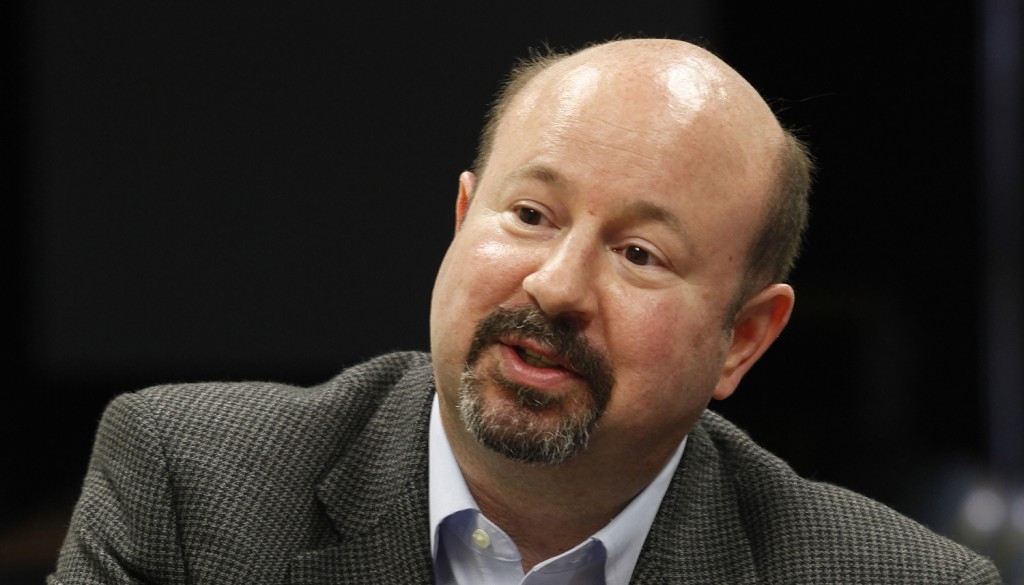
DR. MICHAEL MANN
The Hockey Stick and the Climate Wars: Dispatches from the Front Lines
Date: March 20, 2015
Location: The Lyric Theatre in downtown Blacksburg
UPDATE: View Full Lecture HERE.
Dr. Michael Mann, a climate scientist and central figure in the political debate over climate change, visited Virginia Tech on March 20, 2015. His 4 p.m. lecture at the Lyric Theatre was followed by a brief question and answer session and signing of his book, “The Hockey Stick and the Climate Wars: Dispatches from the Front Lines.”
The free event was sponsored by the Global Change Center at Virginia Tech and the Interfaces of Global Change Interdisciplinary Graduate Education Program.
Mann is a distinguished professor of meteorology at Penn State University, with joint appointments in the departments of geosciences and the Earth and Environmental Systems Institute. He is also director of the Penn State Earth System Science Center. His research involves the use of theoretical models and observational data to better understand earth’s climate system.
MORE INFO:
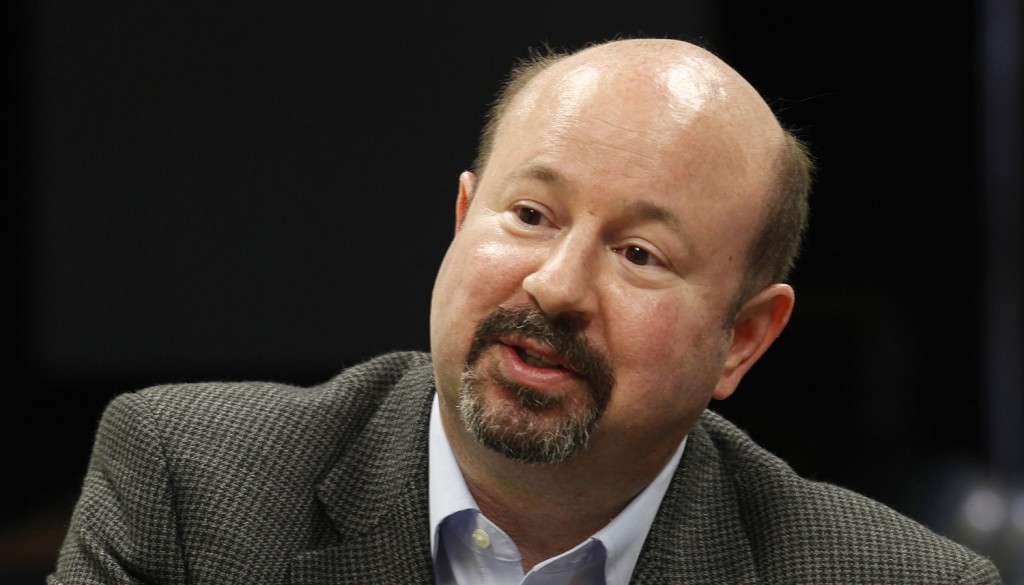
Michael Mann, a climate scientist and central figure in the political debate over climate change, visited Virginia Tech on March 20, 2015.
His 4 p.m. lecture at the Lyric Theatre was followed by a brief question and answer session and signing of his book, “The Hockey Stick and the Climate Wars: Dispatches from the Front Lines.”
The free event was sponsored by the Global Change Center at Virginia Tech and the Interfaces of Global Change Interdisciplinary Graduate Education Program.
Mann is a distinguished professor of meteorology at Penn State University, with joint appointments in the departments of geosciences and the Earth and Environmental Systems Institute. He is also director of the Penn State Earth System Science Center. His research involves the use of theoretical models and observational data to better understand earth’s climate system.
During his visit, Mann also co-lead a science communication workshop for doctoral students with Susan Hassol, director of Climate Communication and a leading expert on effective techniques for communicating science.
“We are thrilled to welcome Dr. Mann to Virginia Tech,” said William Hopkins, director of the Global Change Center and professor of fish and wildlife conservation in the College of Natural Resources and Environment. “A major part of the Global Change Center’s mission is to provide unique training opportunities to Virginia Tech faculty and graduate students. The all-day workshop led by Mann and Sue Hassol will allow the students to learn effective techniques for communicating science to the public and policy makers, and will enable them to spend intimate time learning from leading authorities on climate change and science communication.”
Mann has received a number of honors and awards including the National Oceanic and Atmospheric Administration’s (NOAA) outstanding publication award in 2002, and selection by Scientific American as one of the fifty leading visionaries in science and technology in 2002. He was awarded the Hans Oeschger Medal of the European Geosciences Union in 2012 and the National Conservation Achievement Award for science by the National Wildlife Federation in 2013.
Mann made Bloomberg News’ list of fifty most influential people in 2013. In 2014, he was named a Highly Cited Researcher by the Institute for Scientific Information and received the Friend of the Planet Award from the National Center for Science Education. He is a Fellow of both the American Geophysical Union and the American Meteorological Society.
“Dr. Mann’s visit to campus is an exciting opportunity to learn from a world-renowned scientist at the front line of both research and public engagement,” said Quinn Thomas, an assistant professor of forest resources and environmental conservation in the College of Natural Resources and Environment, who teaches courses in climate science on campus. “Through his peer-reviewed research, which provides historical context for recent temperature changes, and his writings, which are more geared toward a general audience, Dr. Mann’s work challenges us to think critically about our changing planet while not losing sight of the larger picture.”
Chartered earlier this year, the Global Change Center at Virginia Tech seeks to raise awareness about climate change and other global problems such as pollution and invasive species that threaten the environment and society.
Story by Lindsay Taylor Key, Communications Officer at Fralin Life Science Institute



